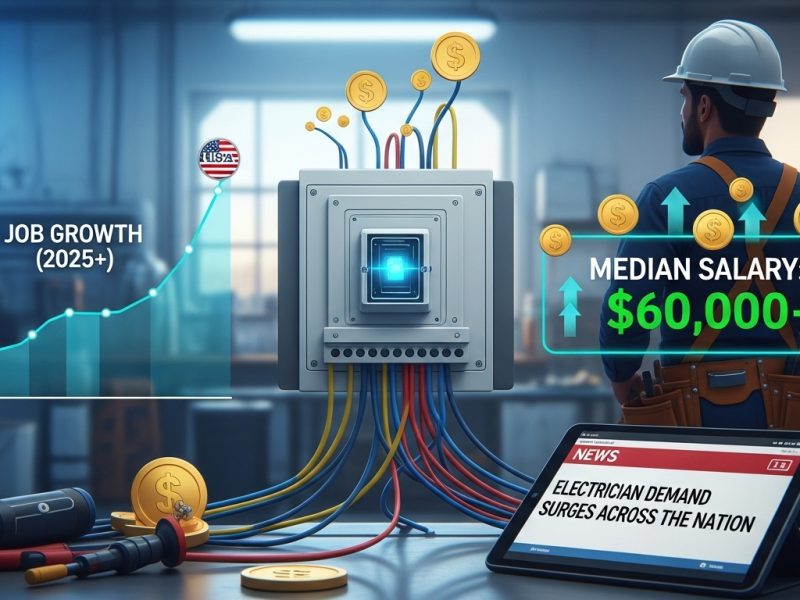If you’re considering a stable, hands-on, and rewarding career, look no further than the electrical trade. The job outlook for electricians in the USA is not just bright; it’s electrifying. With faster-than-average growth projected, competitive wages, and a path to a debt-free education, becoming an electrician offers a compelling alternative to traditional four-year college degrees. This guide will provide a data-driven deep dive into the profession, exploring salary expectations, job growth, and the steps you need to take to secure your future in this essential field.
A Shockingly Positive Job Outlook
The demand for skilled electricians is on a powerful upward trend. According to the U.S. Bureau of Labor Statistics (BLS), employment for electricians is projected to grow 11% from 2023 to 2033, a rate significantly faster than the average for all occupations.
This growth isn’t happening in a vacuum. It’s being fueled by several powerful, long-term trends:
-
Advanced Technology Integration: The rise of smart homes, energy-efficient lighting controls, and electric vehicle (EV) charging stations requires a new level of expertise that licensed electricians are uniquely positioned to provide.
-
Renewable Energy Boom: Federal and state incentives for clean energy have led to a surge in demand for electricians skilled in installing and maintaining solar panels, wind turbines, and battery storage systems. States like Oregon, for example, aim to meet 50% of their electricity needs with renewable sources by 2040, a goal that relies heavily on skilled electricians.
-
Infrastructure Upgrades: Much of America’s electrical grid and building infrastructure is aging and requires modernization, upgrades, and repairs. This creates a consistent stream of work for electrical professionals.
This robust demand translates into real opportunity. An estimated 80,200 electrician job openings are projected each year for the next ten years, many resulting from the need to replace retiring workers . This level of demand provides exceptional job security that is rarely found in other industries.
Electrician Salary: What Can You Earn?
A career as an electrician is not only secure but also financially rewarding. Your earning potential increases with experience, specialization, and geographic location.
-
Nationwide Median Pay: As of May 2023, the median annual wage for electricians across the United States was $61,590 . This figure represents a significant increase from just a few years prior, demonstrating strong wage growth within the trade.
-
Entry-Level to Experienced: It’s important to understand the progression. Entry-level electricians or apprentices typically start between $35,000 and $45,000 annually. However, as you gain experience and advance to a journeyman or master electrician, salaries commonly range from $60,000 to $80,000 per year, with top earners and those in specialized fields making over $90,000.
-
High-Cost, High-Demand States: Wages can be even higher in states with a strong construction industry and high cost of living. For instance, electricians in states like Oregon and Washington often earn well above the national median . In a state like New Jersey, experienced professionals can earn between $70,000 and $95,000.
The table below breaks down the key factors that influence an electrician’s salary:
| Factor | Impact on Salary | Examples |
|---|---|---|
| Experience & Licensing | The single biggest driver of income. Apprentices earn least; Master Electricians earn most. | Journeyman, Master Electrician |
| Specialization | Niche skills in high-demand areas command premium pay. | Industrial, Renewable Energy, Data Centers |
| Geographic Location | Urban areas and states with strong unions/construction pay more. | Washington, New Jersey, California |
| Industry Sector | Commercial and industrial electricians often out-earn residential. | Manufacturing Plants, New Construction |
The Path to Becoming an Electrician: “Earn While You Learn”
One of the most significant advantages of pursuing a career as an electrician is the accessible and affordable path to entry. Unlike many professions that require a massive upfront investment in a college degree, you can become an electrician through a paid apprenticeship.
-
Education: A high school diploma or GED is typically the first step, with a focus on math and science being beneficial.
-
Apprenticeship: This is the core of your training. Apprenticeship programs, often sponsored by unions (like the IBEW), contractor associations, or individual companies, typically last 4-5 years. During this time, you “earn while you learn,” receiving both classroom instruction and paid on-the-job training . This model allows you to gain a debt-free education while building valuable experience.
-
Licensing: After completing your apprenticeship, you must become a licensed journeyman electrician, which involves passing a exam. Further experience and testing can lead to a Master Electrician license, which allows you to supervise work and run your own business.
Top Specializations for Maximum Earnings
While a general electrician can earn a great living, specializing in certain high-growth areas can significantly boost your income potential.
-
Renewable Energy Electrician: Specializing in solar photovoltaic (PV) systems, wind turbines, and battery storage can lead to earnings 15-20% more than those of general electricians . This field is poised for massive growth as the country pushes toward a clean energy future.
-
Low-Voltage & Data Electrician: With our increasing reliance on technology, specialists who handle data cabling, telecommunications, security systems, and fiber optics are in high demand.
-
EV Charging Station Installer: The electric vehicle revolution is here. Electricians with the expertise to install and maintain residential and commercial EV charging stations are seeing a rapid increase in demand.
-
Industrial Electrician: These electricians work in complex environments like manufacturing plants, factories, and refineries. The work often involves sophisticated machinery and control systems, commanding a higher premium.
-
Commercial Electrician: Focusing on large-scale projects like office buildings, retail spaces, and new construction can be more lucrative than residential work.
The Future is Electric: Job Security in an Automated World
In an era where automation and artificial intelligence threaten many jobs, the electrical trade remains remarkably resilient. The highly situational, hands-on nature of the work—involving troubleshooting, complex installations, and repairs in unpredictable environments—requires a level of human problem-solving that cannot be easily replicated by robots.
Electricians are not just wiring buildings; they are powering the future. From ensuring the reliability of our power grid to integrating the smart technologies that will define our homes and cities for decades to come, electricians are, and will remain, indispensable.
Is an Electrician Career Right for You?
If you are looking for a career that offers:
-
Strong job security and high demand.
-
A debt-free path to a skilled profession.
-
Competitive wages with a clear progression to six-figure potential.
-
Hands-on, varied work that is resistant to automation.
-
The pride of building and maintaining essential infrastructure.
Then a future as an electrician could be your perfect fit.
Disclaimer
The information provided in this article is for general informational and educational purposes only. It is not intended as financial, career, or professional advice. The salary figures, job growth projections, and other data are based on publicly available information from sources like the U.S. Bureau of Labor Statistics and industry publications, and are subject to change. Individual earnings, job prospects, and career paths will vary based on location, experience, education, specialization, and market conditions. You should consult with relevant local apprenticeship programs, licensing bodies, and financial advisors to make informed decisions about your specific situation. The links in this article may lead to external sites over which we have no control, and we are not responsible for their content.






